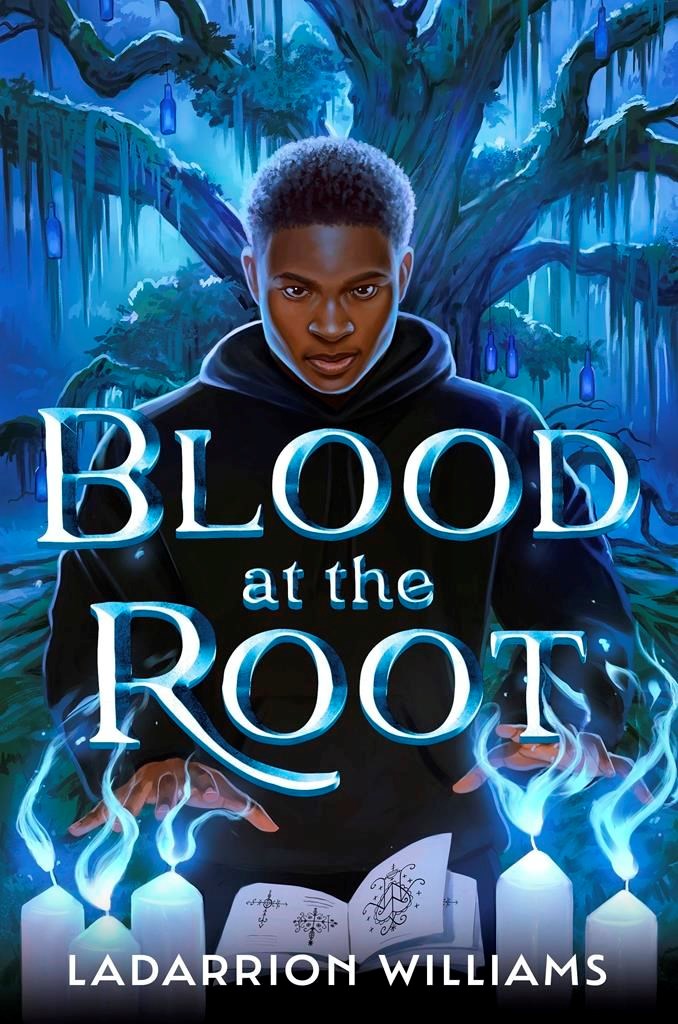It all began with a post on Twitter. It was 2020 during the height of the pandemic and LaDarrion Williams was thinking about the lack of diversity in the fantasy genre. He proposed: “What if Harry Potter went to am HBCU in the South?”
“Growing up, I watched ‘Twilight,' I watched ‘Hunger Games’ and ‘Divergent’ and ‘Percy Jackson,’ which is one of my favorite books. I didn’t see myself in those stories, and I didn’t feel seen by them,” said Williams. He is a self-taught playwright, filmmaker and screenwriter.
The post went viral and started a dialogue online, leading Williams down a long road to make good on his idea. He's the first to admit though that the process was not a fairytale.
Williams' “Blood at the Root,” the first in a three-book deal, arrives in stores Tuesday. Jalyn Hall ("Till", “All American”) recorded the audio version. The book follows Malik, a 17-year-old with magical powers who gets accepted into Caiman University, an HBCU with a “Blackgical culture” and a magic program.
Williams talked to The Associated Press about how his tweet became a novel and his inspirations for “Blood at the Root.”
Answers have been edited for clarity and brevity.
___
AP: You sent that... and got a big reaction. Then what happened?
WILLIAMS: I wrote it as a TV pilot. I didn’t intend it to be a novel. I was sharing (the process) online and people were sending me money with CashApp and Venmo from the U.S., Canada, even New Zealand. They said, “Go make this a short film.” It was October 2020. Things were shut down. You couldn't buy hand sanitizer. I asked my friends, and we shot this magical short film around LA. We snuck onto the UCLA campus. Sorry, UCLA, but we wanted to film on an actual college campus. That’s when I realized this story was very special.
I thought I had it all. I thought I had the viral tweet, , I had the script, I had the idea. I thought Hollywood was going to give me a multimillion-dollar offer. I was humbled very quickly with that. No calls were coming. I struggled to get meetings with different production companies and showrunners and studios. Nobody wanted to meet with me. I was really confused and fell into a deep depression.
AP: Is that when you decided to pivot and write the book?
WILLIAMS: I was very sad. There were some days I couldn't even get out of bed. I felt like I failed my friends who risked their health. I felt I failed people who supported it on social media. It was kind of embarrassing. My friend one day said, “Why don’t you turn it into a book?” With everything that was going on in the world and in America, like the civil unrest, I didn't think publishing would want this.
At first, they didn't. I was getting rejections left and right saying, “We can't connect with this. It's not marketable.” One of my biggest rejections came on my birthday, Dec. 3, 2022. In late January 2023, I was driving for Uber, and I got a call from my agent who said we got a three-book deal.
AP: Did you scream? Cry?
WILLIAMS: No. I turned the Uber app off and drove home in silence. I went to Ralphs and sat in the parking lot and said, “I sold a book. I didn't just sell a book, I sold three.” Then I started screaming and calling everybody.
AP: Talk about the protagonist Malik.
WILLIAMS: I wanted to create a Black boy from Helena, Alabama, which is where I’m from, who has cool magical powers. It's a coming-of-age story about a 17-year-old who gets to attend this really cool school. He's fun. He makes friends. Friendships, especially as a teenager, are very important. They kind of set you up for life. Malik also connects with his family and ancestry. He's had childhood trauma and hardships, and he's going to make mistakes, but the mistakes don't cost him his life. I want people to get to know him. The way he speaks, the way he thinks. I wanted him to have vulnerability and softness. He extends the love he didn't have as a child to his foster brother. I wanted to create all of that through the lens of magic.
AP: You were also very specific about how you wanted the cover to look.
WILLIAMS: The only time I saw myself on book covers was Christopher Paul Curtis' “The Watsons Go to Birmingham — 1963” and "Bud Not Buddy." It was a nonnegotiable with my publishers. I was like, "I need a Black boy on the cover. I don’t care how we do it. That’s what I want.” I was a little bold, but it’s all right. I also wanted him in a hoodie on the cover because, you know, black boys in hoodies are often criminalized. I got what I wanted.
AP: Do you still see the story as a TV series?
WILLIAMS: There are talks about it. I remember going to watch “Twilight,” as a 6-foot-3 Black kid in Alabama. It was such a cool era to go to the movies and be in this fandom and meet other people that you would never meet. I want to recreate that moment when “Black Panther” dropped, and everybody was just buzzing about it. I want to do that for television. I want that for Black kids.
Alicia Rancilio, The Associated Press



